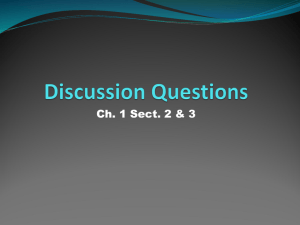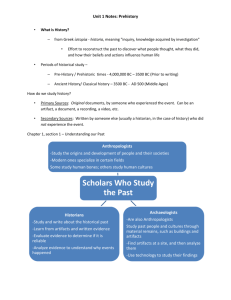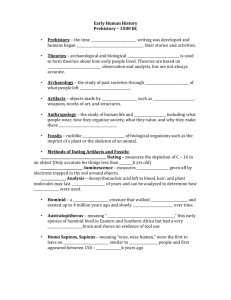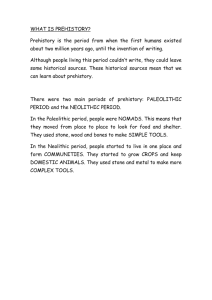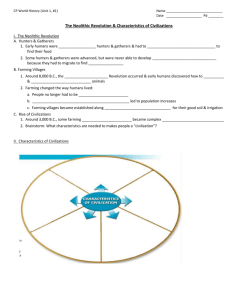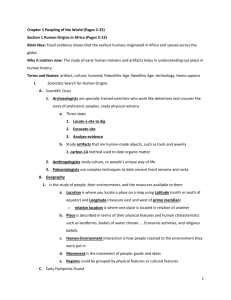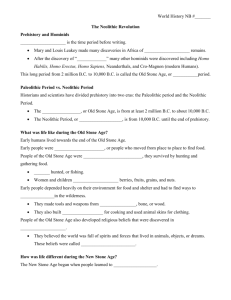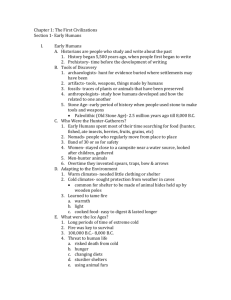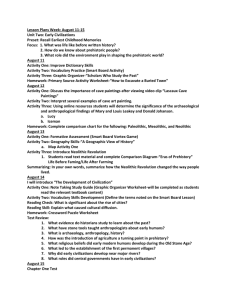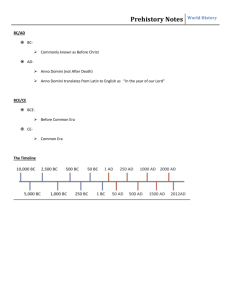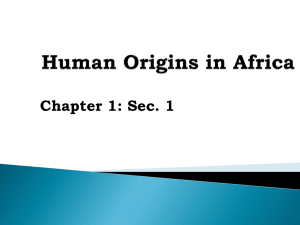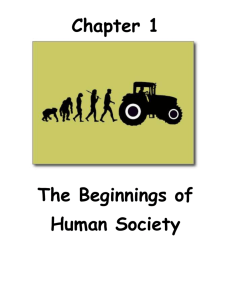Foundations of Civilization Prehistory–300 B
advertisement
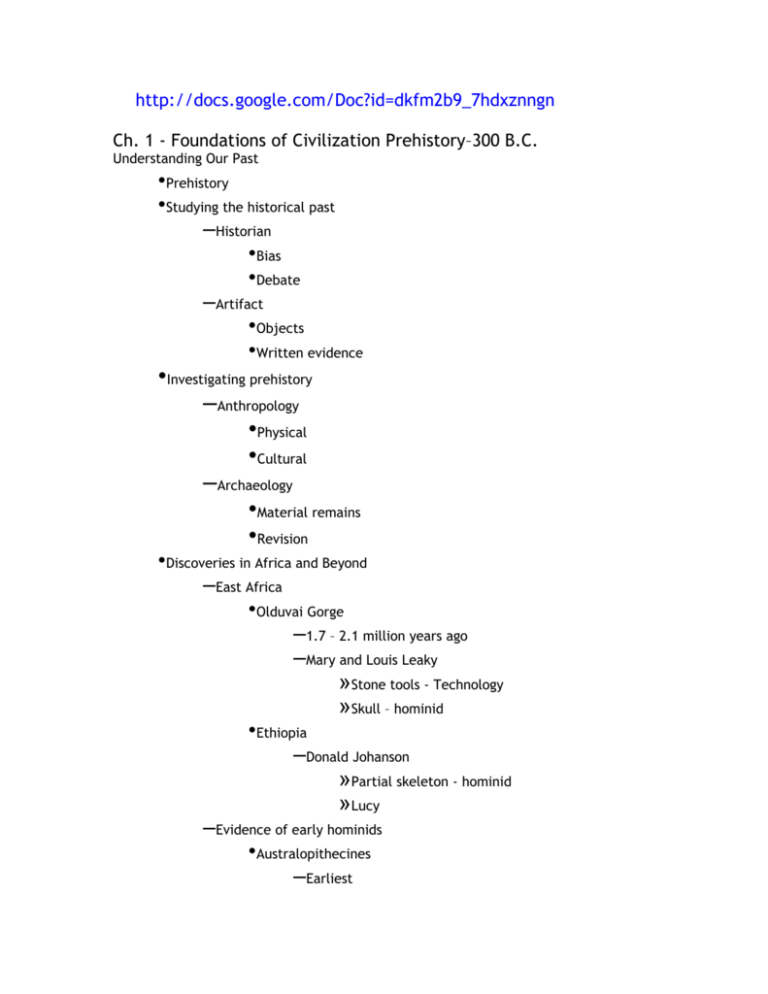
http://docs.google.com/Doc?id=dkfm2b9_7hdxznngn Ch. 1 - Foundations of Civilization Prehistory–300 B.C. Understanding Our Past •Prehistory •Studying the historical past –Historian •Bias •Debate –Artifact •Objects •Written evidence •Investigating prehistory –Anthropology •Physical •Cultural –Archaeology •Material remains •Revision •Discoveries in Africa and Beyond –East Africa •Olduvai Gorge –1.7 – 2.1 million years ago –Mary and Louis Leaky »Stone tools - Technology »Skull – hominid •Ethiopia –Donald Johanson »Partial skeleton - hominid »Lucy –Evidence of early hominids •Australopithecines –Earliest –Africa –7 million years ago •Homo Habilis (handy man) –Stone tools –2 million years ago •Homo erectus (upright man) –Larger brains and bones –Fire –Hand ax –Asia and Europe – migration –2 million years ago –Evidence around the world •250,000 – 100,000 years ago •Homo Sapien (wise man) –“Out of Africa” –Neanderthal »Europe and Western Asia »Disappeared 30,000 – 50,000 yrs. ago –Early modern »Around the world Turning Point: The Neolithic Revolution •Prehistoric eras –Paleolithic •Old stone age •2 million – 10,000 B.C. –Neolithic •New stone age •10,000 B.C. until end of prehistory •New skills and technologies •Old Stone Age Skills and Beliefs –Early modern humans •Nomads –20-30 group –Hunters and gatherers •Survival skills –Tools and weapons –Fire –Clothing –Language •Water travel –Australia – 40,000 yrs. Ago •Religious beliefs –Burying dead – afterlife –animism •New Stone Age –Farming brings Neolithic Revolution •Nomad to farmer •First settled villages •New skills and technology –Domesticate plants and animals •Varied by location •Dogs in China –13,000 B.C. •Settled villages –Çatalhüyük, Turkey •7,000 B.C. •6,500 people •3 times the size of Jericho –Jericho, Israeli controlled W. Bank •10,000 – 9,000 B.C. •Few thousand people •Wall indicates leader or government •Changes to way of life –Men dominate family, economic, and political life •Council of elders •Warriors –Differences in wealth •New Technologies –Farming •Protection •Quantities of seed •Time measured •Use animals for labor –Workshops •Weapons and tools •Weaving •Pottery –Discoveries •“Ice Man” –Neolithic –European Alps •Technologies varied –Time – thousands of years –Type Beginnings of Civilization •First cities and civilizations –Major river valleys •Fresh water •Transportation •Animals come to drink •Fresh soil from flooding •Food surpluses –Growing populations –Job specialization •River Valley Civilizations –Sumer •Tigris and Euphrates •Middle East –Egypt •Nile •Africa –Indus •Indus •India –Shang •Huang •China •First civilizations in the Americas –Highlands not river valleys –Peru, Mexico, and Central America –Farming •On mountain sides •Fill in swamps –Inca, Olmec, and Maya •Away from cities –Farming villages –Nomads •steppes Basic Features that Define Civilization 1. Organized governments 2. Complex religions 3. Job specialization 4. Social classes 5. Arts and architecture 6. Public works 7. Writing Organized Governments •Oversee large-scale efforts –Food production –Flood control projects –Irrigation •Rulers –Priests –Warrior kings –Political and religious power •Royal officials –Laws –Taxes –Defense Complex Religions •Polytheistic •Favor of the gods –Rituals –Temples –Sacrifice •Priests –Special training –knowledge Job Specialization •City jobs –Artisans –Metalworkers –Builders –Soldiers –Entertainers •Dependent on others Social Classes •Ranked according to jobs –Priests and nobles –Wealthy merchants –Artisans –Peasant farmers –Slaves •Pay debt •Punishment •Captured •Women and children Arts and Architecture •Expressed talents, beliefs, and values •Temples and palaces –Power of government and religion –Decorated •Paintings •Statues Public Works Writing •Large-scale projects –Irrigation systems –Roads and bridges –Defensive walls •Benefit the city •Not developed by all civilizations •Variety –Appearance –Structure –Purpose •Uses –Temples –Monuments •Development –Pictographs –Symbols –Scribes •Kept records •Few women •Political power Civilizations Change Over Time •Environment –Event – earthquake, volcano, etc. –Over farming land –Limited resources •Cultural Diffusion - the spread of ideas, customs, and technology from one people to another –Trade –Migration –warfare •Cities Grow into City-States –City-state – political unit that included a city and its surrounding lands and villages •First empires –Many cities and villages conquered –Empire – group of states or territories controlled by one leader –legacy
